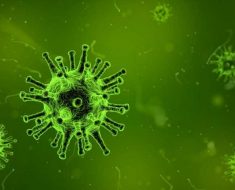
The dramatic toll that COVID-19 has taken on the U.S. is apparent, but as caseloads come down and mandates are loosened it has become increasingly obvious how much of an impact the pandemic had on food service workers in industries like the fisheries. A study from the University of New Hampshire looked at the direct and indirect effects of the global pandemic on U.S. seafood workers by tracking cases and outbreaks and found seafood workers were twice as likely to contract COVID-19 as workers in other food industries.
“The U.S. seafood industry was hit pretty hard, especially workers in high-density workplaces like seafood processing plants where social distancing was difficult,” said Easton White, assistant professor of biological sciences. “Even though COVID-19 precautions were set in place reducing the number of workers on processing lines it meant longer shifts and increased exposure overall. Fishing vessels had similar issues, where crews on crowded boats faced challenges wearing PPE, or masks, in wet and windy conditions.”
In the study, recently published in the journal PeerJ Life & Environment, researchers show how U.S. seafood workers were disproportionally affected by COVID-19, highlighting the various direct and indirect effects of the virus and tracking the number of cases and outbreaks. They reviewed news reports, scientific articles and white papers and found most cases of COVID-19 among the seafood workers were reported during the height of the pandemic, in the summer of 2020 and the beginning of 2021, and the majority were among workers involved in seafood processing who tend to work in close proximity to each other for long hours. Cases of COVID-19 were found in all U.S. coastal areas however Alaska, home to 60% of the U.S. commercial fisheries, experienced the largest number of outbreaks. Researchers also noticed more physical and mental taxing conditions like concerns about workplace safety, contracting COVID-19, access to medical services, vaccination and paid sick leave. They also took into consideration the economic consequences of the pandemic including changes in markets, supply and demand, in addition to revenue loss, price fluctuations, supply chain issues and labor shortages.
The researchers point to the effectiveness of the preemptive response to COVID-19 from the Massachusetts town of New Bedford which contains a massive shipping port and compare it to pandemic practices in Dutch Harbor and the Aleutian Islands in Alaska, home of the two largest commercial fisheries in the country. New Bedford was one of the first to open both testing centers and vaccination sites specifically for seafood workers leading to limited number of cases and outbreaks while the fishing industry in Alaska reportedly had trouble managing the virus.
Source: Read Full Article





